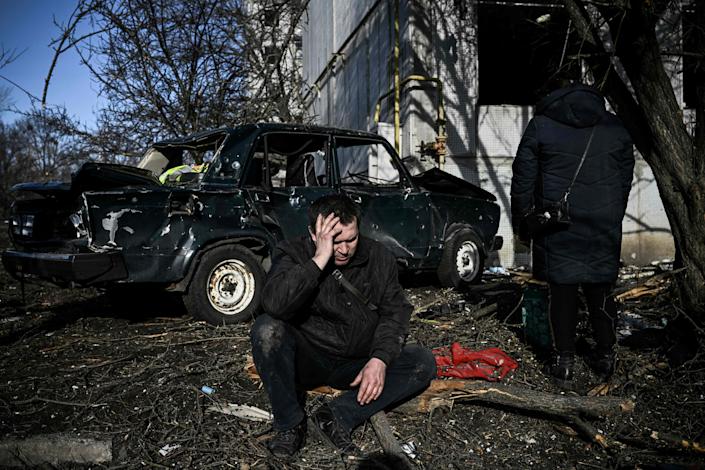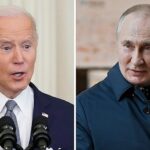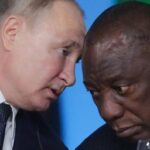
“Fears” is the title of a celebrated poem penned in 2007 by Yevgeny Yevtushenko, the great Russian poet, long before Vladimir Putin’s war gave the lie to his line, “Fears are dying out in Russia, like the ghosts of bygone years.” At this critical juncture in the country’s history, the theme of Yevtushenko’s musings has lost none of its pertinence.
Decades after the atrocities perpetrated by Joseph Stalin during the 1932 famine, estimated to have killed some 3 million, and by the Nazis in 1941 at Babi Yar, where they killed tens of thousands of Jews, fear is once again pervasive in much of Ukraine . It finds a resounding echo in the blaring of airstrike sirens summoning civilians to their shelters, in the huge outflow of terror-stricken refugees fleeing violence, in the thuds of bombs and missiles aimed at military infrastructures and residential buildings.
As much as the brutality of the invasion, Putin’s blatant lies and unpredictability add a sense of deep-seated angst to the prevailing mood of uncertainty. What will be Putin’s next move? What are his short-term objectives for Ukraine, and his longer-term strategy in dealing with neighboring NATO countries? How will the economic and financial sanctions taken by the West impact the lives of Russians, Ukrainians and Europeans?
The answers are anything but clear, but before venturing some guesses it may help to remind ourselves of a basic fact: Fear is not the monopoly of the inhabitants of western Ukraine, Putin’s enemies against his allies in the eastern provinces of Donetsk and Luhansk. It is also widely felt among the latter’s citizens
Few have forgotten how Petro Poroshenko (Ukrainian President Volodymyr Zelensky’s predecessor) suddenly decided to freeze government pensions and cut off funding for schools and hospitals in the two Russian-speaking break-away provinces; nor have they turned a blind eye to his all-too-intimate relationship with the so-called Azov battalion, once described as “an ultranationalist paramilitary group of around 400 men, that uses Nazi salutes and insigna.”
This is explained in some detail by Lev Golinkin in his Dec. 9, 2014 New York Times column, appropriately headlined, “Driving Ukrainians Into Putin’s Arms.” As one who was born in Ukraine before migrating to the U.S., the author deserves credit as well as a measure of credibility for shining a light on some of the roots of Putin’s popularity in eastern Ukraine. This should disabuse us of the notion of a possible reversal of course by Putin in the foreseeable future, no matter how hurtful in the short term the sanctions may turn out to be.
Nor are qualms absent from the speculations of governments in NATO countries about the unanticipated consequences of Western-imposed sanctions. Added to the risk of a substantially higher cost of petroleum and natural gas after the dismantling of the Russian-engineered Nordstream 2 pipeline is the likelihood of counter-sanctions, cyberattacks and the flow of millions of Ukrainian refugees into Western Europe.
Could it be that they will turn into one of the many external threats so feared by Putin? A more likely source of anxiety for the Kremlin stems from the surprisingly strong and admirable resistance of the Ukrainian army and civilian irregulars, whose courage is further boosted by the substantial delivery of defensive weapons from the West.
Not the least of our worries is whether other states may be targeted after the fall of Ukraine. After Putin’s takeover of Crimea, the small state of Moldova was seen (inaccurately) as a most likely candidate. Today some do not hesitate to include the Baltic states as prospective victims of Putin’s neo-imperial instincts. At no other time since Putin’s rise to power has the future seemed so uncertain.
Aside from the consequences of Putin’s obsession about NATO’s imminent threat to Russia’s security, reasons for concern include some of his most outrageous lies: the genocide of Russian-speaking easterners perpetrated by the citizens of western Ukraine, and the presence of neo-Nazi elements in Zelensky’s government, making it imperative to “de-Nazify” Ukraine. While Stalin never acknowledged the Holocaust or any other genocide, Putin has evidently no scruples about inventing one: the Soviet leader’s denialism and his tsarist successor’s baseless assertions are in almost perfect alignment in their efforts to falsify history.
As one of Uktaine’s darkest chapters is being written in blood, there is perhaps some consolation in the fact that it is a Russian, Yevtushenko, who, better than anyone else, found the words needed to inspire courage in this most fearsome moment, when Ukrainians are putting their lives on the line:
“I wish that men were possessed of fear
Of condemning man without proper trial,
The fear of debasing ideas by means of untruth
The fear of exalting oneself by means of untruth,
The fear of remaining indifferent to others
When someone is in trouble or depressed,
The desperate fear of not being fearless.”
René Lemarchand is an emeritus professor of political science at the University of Florida.
Join the conversation
Send a letter to the editor (up to 200 words) to letters@gainesville.com. Letters must include the writer’s full name and city of residence. Additional guidelines for submitting letters and longer guest columns can be found at bit.ly/sunopinionguidelines.
Journalism matters. Your support matters.
Get a digital subscription to the Gainesville Sun. Includes must-see content on Gainesville.com and Gatorsports.com, breaking news and updates on all your devices, and access to the Gainesville.com ePaper. Visit www.gainesville.com/subscribenow to sign up.
This article originally appeared on The Gainesville Sun: René Lemarchand: Putin’s war has again brought fear to Ukraine




